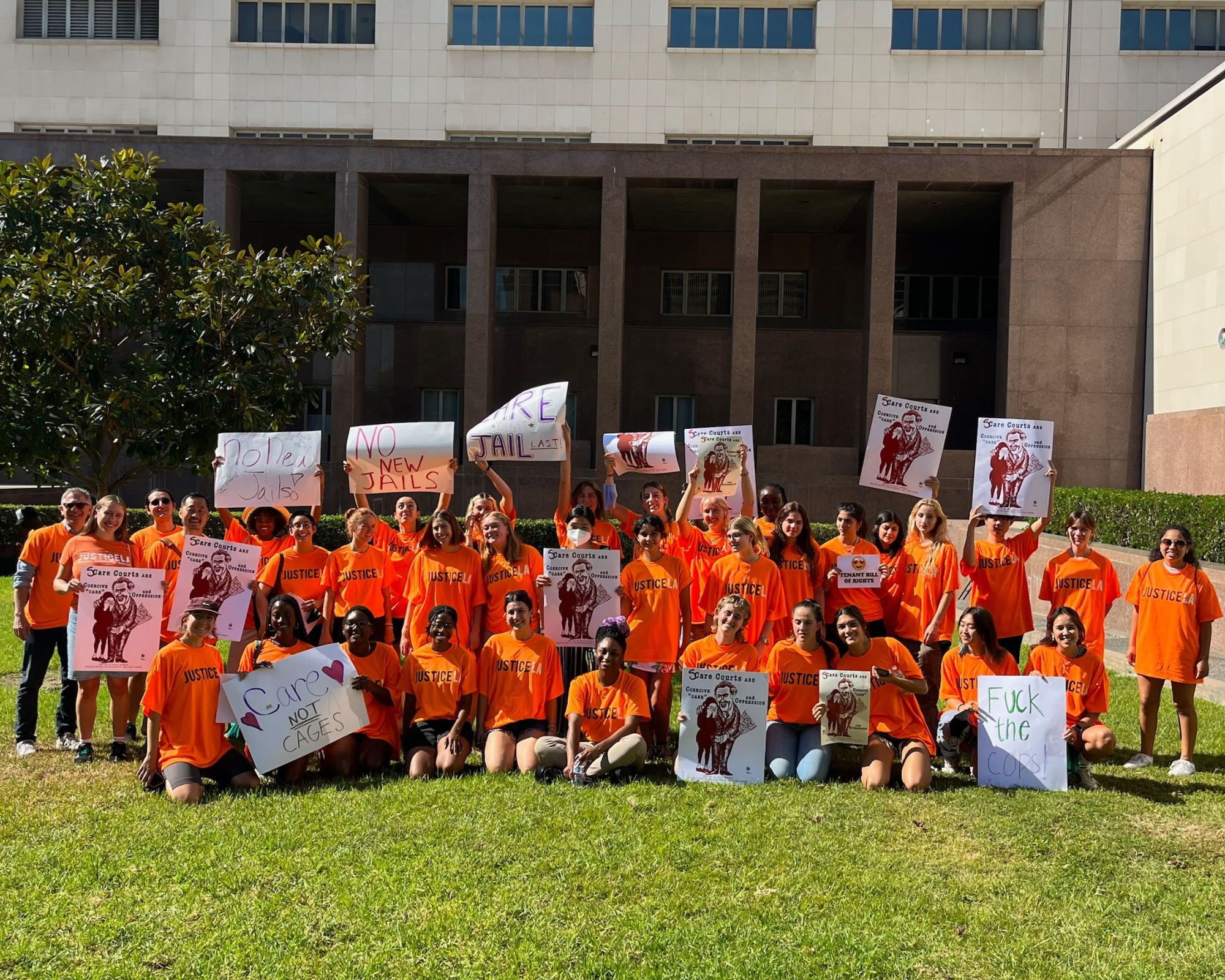
October 7, 2022
Mobilized by a Scripps class and the JusticeLA coalition, students boost demands for community-based care

34 Claremont students protested motions to build new locked mental health facilities at an LA County Board of Supervisors meeting last Tuesday. Students in Scripps Professor Tom Kim’s Practicing Abolition Democracy class mobilized for the meeting after a call to action by the abolitionist coalition JusticeLA.
The Board of Supervisors, the highest legislative and executive authority in LA County, committed to closing Men’s Central Jail without building a replacement in 2021. JusticeLA, an abolitionist coalition of 80 grassroots organizations, mobilized protests of the new mental health facility motions as a violation of this commitment.
The Sep. 27 meeting was the first in-person meeting of the board in two years, taking place in the Kenneth Hahn Hall of Administration in downtown LA. Claremont students arrived via a Scripps shuttle, Metrolink and car leaving at 7:15 AM and returned to campus around 12:30 PM.
Last Tuesday’s action was the latest in JusticeLA’s years-long campaign to reduce the number of incarcerated people in LA.
The coalition formed in 2017 to campaign against the construction of a $2.2 billion correctional mental health facility. The campaign succeeded in pressuring the board to vote to cancel construction of the facility in Aug. 2019.
After community advocacy the board also commissioned a report on “Alternatives to Incarceration” (ATI) in Feb. 2019, resulting in the creation of a “Care First, Jails Last” decarceration roadmap centered on strategies of community care and diversion from the criminal justice system.
The board furthered these efforts by calling for the creation of a plan to close Men’s Central Jail within a year in July 2020 and establishing a Jail Closure Implementation Team (JCIT) in June 2021 to close Men’s Central Jail “without having to ever rebuild it by concurrently building out a sustainable community-based continuum of care.”
But Mens’ Central Jail is still standing, and inmates inside continue to suffer from what the ACLU called “abhorrent conditions” in a Sep. 2022 motion against the LA Sheriff’s Department (LASD).
“People with serious mental illness [were] chained to chairs for days at a time, where they [slept] sitting upright,” and were denied medication or adequate drinking water and food, according to an ACLU press release.
The same month, the mother of an inmate who was beaten to death by Sheriff’s department deputies in Men’s Central Jail filed a lawsuit against LASD. Two more men have died in the jail since April 2022, according to the ACLU.
JusticeLA continues to organize around objectives of closing Men’s Central Jail, reducing the LASD budget and banning electronic ankle monitors, according to Ambrose Brooks, coalition coordinator at JusticeLA.
A central issue surrounding decarceration in LA is the necessity to provide support to incarcerated people with mental health care needs. 7,128 of the 14,805 people in LA County jails have mental health care needs, 1,608 of whom have “debilitating mental [illnesses] that could pose a danger to themselves or others,” according to a Board of Supervisors document.
At the Sep. 27 Board of Supervisors meeting, supervisor Katherine Barger, whose constituent region includes Claremont, introduced a motion directing the Sheriff’s Department to create plans for a “secured mental health facility” to supplement Men’s Central Jail.
“We must face the harsh reality that not all will qualify for diversion to community based programs based on a variety of factors, including their charges and their threat to public safety,” Barger wrote in the motion.
Supervisors Hilda Solis and Janice Hahn introduced another motion also requiring reports for the creation of new secured mental health facilities, but for “non-correctional” ones through previously established JCIT and ATI initiatives rather than the Sheriff’s Department.
While the motion also pushes for non-community based care, Solis and Hahn acknowledged their commitment to community care per previous approved motions.
“The Board needs to take swift action to build patient-focused facilities that will help depopulate the jail, including both secured, non-correctional mental health care facilities [and community-based ones],” Solis and Hahn wrote in the motion.

JusticeLA opposed both measures on the grounds that they violated the board’s previous commitment to closing Men’s Central Jail without constructing replacement facilities. Members of the coalition gave public comment in-person at the meeting and by calling in.
Students met with JusticeLA organizers outside of the hall to pick up orange t-shirts and signs reading “Scare courts are coercive ‘care’ and oppression.”
Because only 100 people were allowed into the in-person meeting, most JusticeLA organizers and Claremont students were unable to make it into the hearing room, but gathered outside the building and listened to the meeting’s proceedings virtually.
Ultimately Barger’s motion was defeated in a 3-2 vote, but Solis and Hahn’s motion passed unanimously.
Though not what JusticeLA wants, the result was expected, Brooks said. Because the motion requires a report within 90 days, JusticeLA organizers are taking time to rest and strategize next moves.
“It wasn’t a loss for us. We knew that [Solis and Hahn’s motion] would pass before we got there,” Brooks said. But the meeting showed that “supervisors are demanding action,” they said.
In particular, Brooks noted that several supervisors gave statements in meeting discussions that organizers will work to hold them accountable to. Barger said during the meeting that the county has a “moral and a constitutional obligation” to care for mentally ill inmates, Brooks pointed out.
“So we’re asking [the board], what are you going to do about the murderous sheriff’s department that runs the jails? If you have a moral imperative to care for people inside of the jails, we demand you address the violence at the hands of the department inside of the jails,” Brooks said.
Members of Kim’s Practicing Abolition Democracy class led mobilization of students for the meeting.
Students in the class first heard about the meeting from JusticeLA organizer on a Sep. 14 virtual action Zoom call, said Lalia Kent SC ’23, who helped mobilize for the meeting.
“It would be incredible if y’all could get some people out for this because we want to make a statement,” Kent recalls the organizer saying. “The next day we come to class, we update [Tom Kim] about this thing that Anthony told us…and the group of people that were mobilizing were just the people that stuck around after class and were like, let’s get everyone’s numbers. Let’s actually scaffold out a plan.”
In the following two weeks students made announcements about the meeting in leftist clubs on campus and in their classes. The 5C Prison Abolition Collective forwarded two email blasts from the class to their mailing list.
On Sep. 25, students in the class hosted a Zoom meeting with information about the motions being discussed at the meeting.
Students in the class also created a Google Form to coordinate travel and requested the Scripps shuttle to transport students to the meeting through Kim.
The form, which included virtual action resources for students who couldn’t attend in person, ultimately got 80 responses. The next steps are to go from “mobilizing” to “organizing”, Kent said.
“And a lot of our conversations after that were like, how do we retain all this energy? How do we on-ramp these people that are maybe new to these spaces, and how can we build community from these respondents?”
Students in the class sent a follow-up email to respondents with ways to continue being involved after the meeting and will continue mobilizing for JusticeLA actions, Kent said.
For the larger Prison Abolition collective on campus, this was only the latest in a history of collaboration with JusticeLA and other community organizations.
Students have gone to previous Board of Supervisor meetings at JusticeLA’s call, including the March 2020 meeting when the board approved of the “Care First, Jails Last” Alternatives to Incarceration plan, according to Tess Gibbs SC ’23, a member of the Prison Abolition collective’s 7-person steering committee.
During the pandemic, members of the collective also attended virtual JusticeLA info sessions and trainings and participated in the coalition’s Virtual Actions, which include sending emails and making social media posts.
Other members have worked with the coalition individually, strengthening ties through personal connections. Gibbs interned for Dignity and Power Now, one of the main organizations in the JusticeLA coalition, during fall 2020. Janet Asante SC ’21 became JusticeLA’s Media Coordinator shortly after graduating.
The collective’s relation with JusticeLA is mutually beneficial, Gibbs said. Dignity and Power Now has hosted trainings on campus, while the collective helps consistently mobilize people for JusticeLA actions.
“I think Claremont students showing up [on Sep. 27] almost doubled the size of the [JusticeLA] people there,” Gibbs said.
In the opposite direction, JusticeLA provides crucial opportunities for student activists to get involved in the larger abolition movement, Gibbs said.
“I think it’s essential that students who are interested in abolition and introduced to it on campus get organized into off campus work,” Gibbs said. “If you’re only looking at things in a campus setting then you’re missing a huge part of the picture.”


Palestine

Palestine

Palestine

Undercurrents reports on labor, Palestine liberation, prison abolition and other community organizing at and around the Claremont Colleges.

Issue 1 / Spring 2023
Setting the Standard
How Pomona workers won a historic $25 minimum wage; a new union in Claremont; Tony Hoang on organizing
Read issue 1